Discover the Best Local Keywords for Blog Post Ideas Part 2
 In our previous article Discover the Best Local Keywords For Blog Post Ideas Part 1 we began a discussion about how to determine the best keyword phrase to use for blog post ideas in order to optimize your article.
In our previous article Discover the Best Local Keywords For Blog Post Ideas Part 1 we began a discussion about how to determine the best keyword phrase to use for blog post ideas in order to optimize your article.
We looked at Google searches and how those can be created for a brick and mortar business or an online one. We discussed how keyword phrases connect your blog article to the search engine indices and then a person uses the keyword phrase to search and find your article.
Now it’s time to get to the non-rocket science part of how to find the best local keywords for your blog post ideas.
The Process of Keyword Research
Let’s stick with the riding lawn mower tires idea from Part 1. In case you are reading this article and not the previous one, we are using a riding lawn mower store which sells lawn mower tires in Petaluma, CA as our example.
When it comes to finding optimized keyword phrase ideas, you want to start with enough possible phrases to find the best. You will want 5 or more when you search. The more keyword phases you have the more articles you can create. However, for the sake of this article we are going to keep things simple and stick to one.
One way to start discovering a lot of long-tail keywords related to your general phrase is to look in Google. After all, Google knows how keyword phrases are doing. It’s Google’s search engine.
Google now has an online program called Google AdWords Keyword Planner. You will have to sign up to Google’s Adwords site to use it, but you aren't obligated to buy any Adwords. You can put many keyword phrases in the search box when you do a search, but I used one, the keyword phrase “riding lawn mower tires.” Here is what I got on page 1:
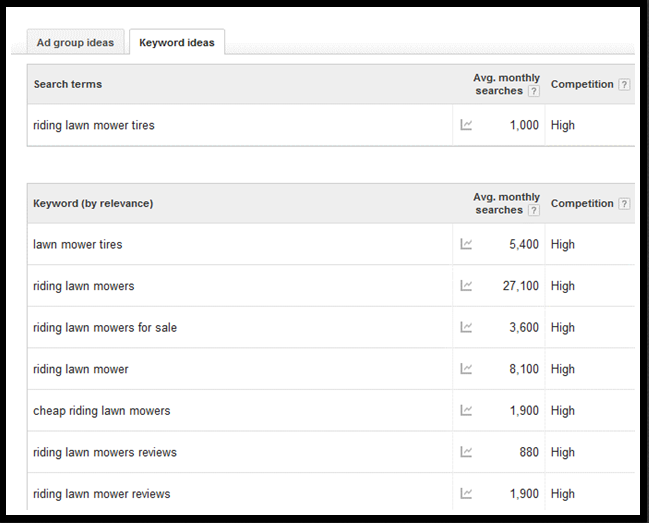
What’s the big blog post idea?
The two important words that I want you to pay attention to are the words at the top of the chart: “Avg. monthly searches” and “Competition.” In the column "Competition" the word “High” doesn’t tell us as much as we might like, but we can learn more through other software.
These are two of the most important ideas that you need to study in depth throughout your research. The key to finding the right keyword phrase is that you want to have a large number of average monthly searches and in the end you will create long tail local keywords that shows the competition as much lower.
When we look, we see that "Riding lawn mowers" had over 27,000 searches. This looks like the start of our keyword phrase.
Let’s take this keyword phrase and plug it into another free, good way to find many blog post idea starter keyword phrases: Übersuggest. You won’t find any information on our keyword on searches or competition, but you will find more ideas that you can plug into the Google Keyword Planner.
Remember we just entered one, but you can enter many more. Ubersuggest will give you all sorts of words using the entire alphabet from its own web searches. Here’s a sample:
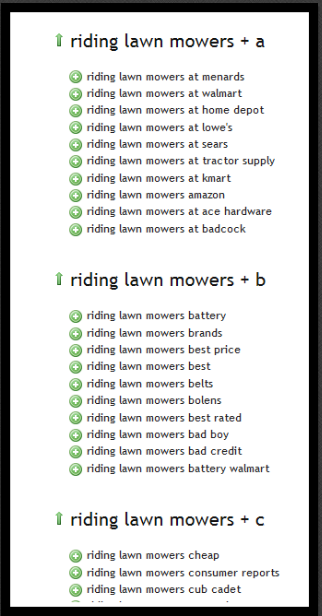 Looking for just a few good keywords
Looking for just a few good keywords
You can take as many of these as you want and run them through the Google AdWords Keyword Planner. Another keyword tracker that will give you search and competition information is Wordtracker’s Free Basic Keyword Demand.
Why go to the trouble of finding many good keywords? You want an enormous amount of searches if you have a very specific local long-tail keyword phrase in mind. Remember that the idea of a long-tail keyword phrase refers to a keyword phrase specific enough to draw specific readers.
How many people are going to be looking for riding lawn mower tires in Petaluma? We know a person doesn’t want to have to compare businesses in Connecticut or Florida if he needs an answer in Petaluma. So you want to hunt for the keywords that will give you the best number of searches with low competition, but yet will be in the searcher's radar.
Hubspot has an excellent keyword tool, but here we are talking about spending money on their top-notch software. If you have been in business for a while without having the success you want, this is a good place to come. Let’s jump over there to get ahead of the game a little. Since I am a certified Hubspot Partner, we can check what Hubspot’s software has to offer.
Let’s start on the main "Keywords" page and click “Add keywords” button at the bottom right in blue:
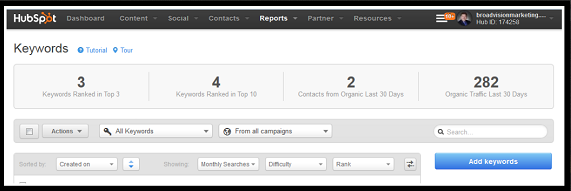
We can use the “Get suggestions button” like with Ubersuggest, but this is where Ubersuggest and Hubspot part ways. The next screen we see is the one about keyword settings.
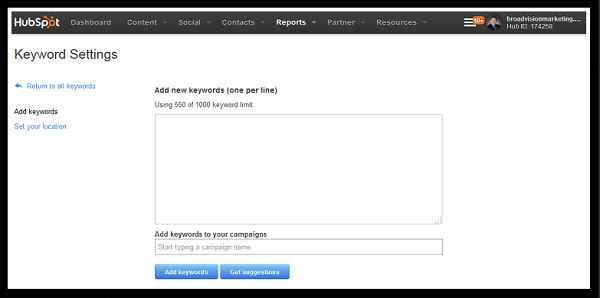
I used the "Get suggestions" button to ask for some keyword suggestions for “riding lawn mowers” and found considerably more. I added 7. So we are going to look at:
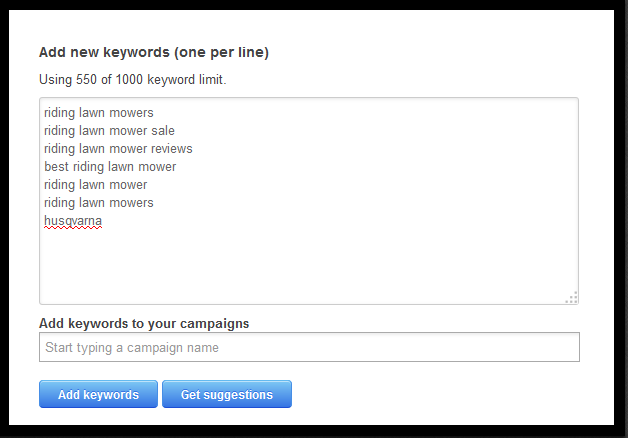
We know push the "Add Keywords" button and see the screen from where we started. First off, Hubspot gives you difficulty ratings as numbers from 1 being very low to 100. This scale is what we have called the competition level. If you want to use this scale to determine what you have in the Google Keyword Adword Planner you can see that low equals the first 33, medium to about 66 and high going from there.
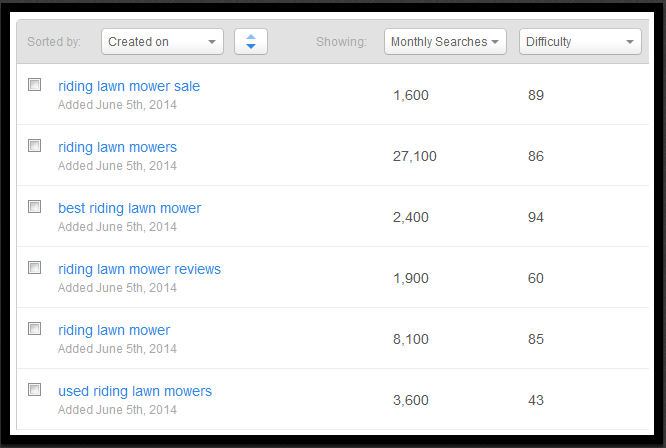
Do you know how we are going to get riding lawn mowers from a very high competition rate of 86 down to a much less competition rate? Yes, you guessed it. We are going local. I plugged "riding lawn mowers Petaluma" into the Keywords List and now I have:

Don’t worry that now our monthly searches are low. Remember the 27,100 total searches. Adding Petaluma makes your difficulty or competition rate drop to 34, which is a medium number. If you add our original search which included tires, you will have even less difficulty.
You can develop a series of blog post ideas centered around “riding lawn mower tires Petaluma.” You know there are many things a person might want to know like “how to take care of riding lawn mower tires in Petaluma,” “how to change riding lawn mower tires in Petaluma,” “the difference between air inflated and solid riding lawn mower tires in Petaluma” for instance. But how do you make sure your articles sound like the kinds of questions people ask,? Here was come to the language or semantic search principles.
Social media helps with the semantics
While Google is where people ask, social media is where people talk among themselves. What can social media provide? You can learn further insights into how people talk about your possible blog post ideas that in turn will make them more searchable semantically. You can read more about it in our article Another Keyword Article about Google Hummingbird and SEO Part 2.
Let’s look at Twitter first because doing searches on Twitter is as simple as putting words into the search area. I put in “lawn mower tires” and got some interesting results.
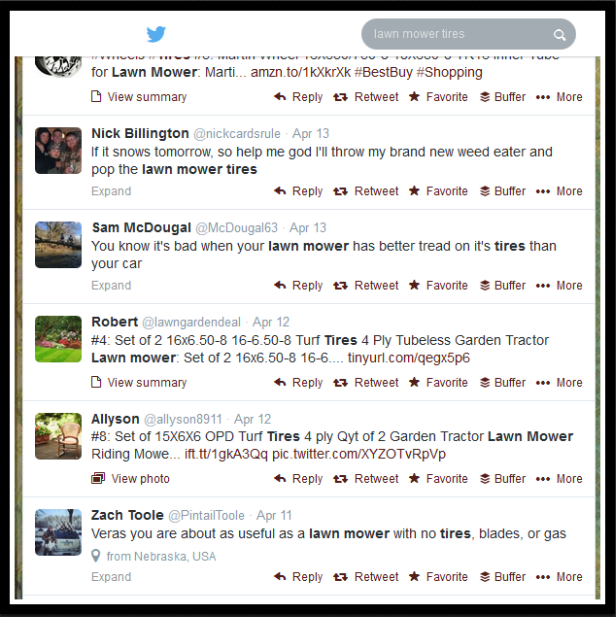
There are some funny remarks in there, but I found one you could use. How about starting a blog saying, “You know it’s bad when your lawn mower tires in Petaluma have more tread than your car.” You could use this as the intro to a blog post talking about tread.
You can also find keyword information for Twitter on Dashboard tools like HootSuite and Tweetdeck. Google+ has a great search feature. Facebook is a little harder to get information from, but you can use the Facebook Graph Search. Each of these social media that you search will give you more information on how people are talking about your keyword phrase. This is where the rubber meets the road so to speak. You want to write about what people need in terms that they are using because they will use those words in their search.
And with a having a person searching we have traveled the chain back to the very beginning of the process.
So let’s recap, shall we?
- You want the best blog post ideas sets of keywords because they signal the search engines to lead a person to finding your site.
- Keywords need to be very specific in order to get you the specific customers you are seeking. You discover the best phrases by going on a treasure hunt.
- You can find the very best keyword phrases using keyword tools, such as Ubersuggest, Google Adwords Keyword Planner or Hubspot.
- The two most important things you need to check about a keyword phrase are:
- What the monthly average of visits equals
- How high the competition is after you create a long tailed keyword
- You want to have a reasonable amount of searches for the keyword considering how specific your phrase is. You want it to come in at the low to middle competition range when you are done.
- Finally, before you write you want to check social media to find out how people are talking about your keyword phrase to enhance semantic searches.
For more information on how you can start reaping the benefits of business blogging starting today, please feel free to pick up a copy of our new guide “An Introduction to Business Blogging” by clicking the button below.
 Jaco Grobbelaar is the owner of BroadVision Marketing. BroadVision Marketing works with business owners to put in place inbound and outbound marketing strategies that consistently secure new clients. The BroadVision Marketing Training Center is located in Petaluma, CA and primarily serves companies in the San Francisco Bay area.
Jaco Grobbelaar is the owner of BroadVision Marketing. BroadVision Marketing works with business owners to put in place inbound and outbound marketing strategies that consistently secure new clients. The BroadVision Marketing Training Center is located in Petaluma, CA and primarily serves companies in the San Francisco Bay area.
Jaco can be reached at jaco@broadvisionmarketing.com or 707.766.9778 or connect with Jaco on Facebook - www.facebook.com/broadvisionmarketing - and LinkedIn - www.linkedin.com/in/JacoGrobbelaar. He can also be found at Jaco+.
You May Also Like
These Related Stories

Discover the Best Local Keywords for Blog Post Ideas Part 1

Internet Marketing tip # 3: Finding Keyword Phrases with Ubersuggest




No Comments Yet
Let us know what you think